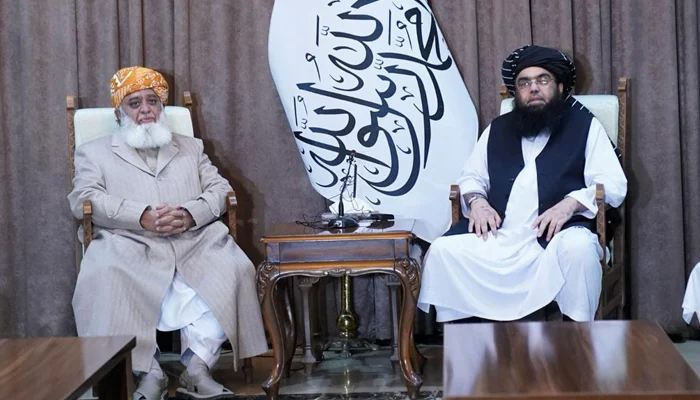Maulana’s visit
Amid rumours, speculations regarding TTP, Pakistan govt has made it clear Pakistan has no interest in holding talks with militants
JUI-F chief Maulana Fazlur Rehman’s recent visit to Afghanistan along with Deobandi clerics has led to the government of Pakistan distancing itself from his visit, the Foreign Office spokesperson saying he visited as a private citizen on the invitation of the Afghan authorities and this was not a visit sponsored by the government. However, as is normal practice, Maulana was briefed by the foreign ministry about Pakistan’s official Afghan policy before he left for his visit. Maulana has been consistently urging the decision-makers of Pakistan and Afghanistan to form a commission to solve the bilateral problems between the two countries through dialogue and mutual understanding. During his visit, Afghanistan’s acting Deputy Prime Minister Maulvi Abdul Kabir reiterated that the Taliban regime would not allow Afghan soil to be used against anyone amid Pakistan’s accusation of cross-border attacks.
Amid rumours and speculations regarding the TTP, the Pakistan government has made it clear that Pakistan has no interest whatsoever in holding talks with the militant outfit. The Foreign Office spokesperson has said that as far as Pakistan’s position with respect to dialogue with the TTP is concerned, Pakistan is not interested in any kind of dialogue: “We have no dialogue taking place, nor do we intend to have a dialogue with TTP, which is responsible for several terrorist incidents inside Pakistan and is responsible for [the] killing of Pakistani civilians and law-enforcement officials".
The government’s response has been consistent about not holding dialogue with the TTP and also that the Afghan Taliban regime should take action against the TTP in its territory because the terrorist outfit has been provided safe havens inside Afghanistan. Ever since the fall of Kabul, terrorism has made a comeback at a swift pace in the country. Terrorist attacks have increased consistently and manifold in Pakistan. Imagine that the number of attacks in the first half of 2023 saw a total of 271 attacks, claiming 389 lives and injuring 656 others, according to the Pakistan Institute for Conflict and Security Studies (PICSS). The second half of 2023 was not any better. The year 2024 may not be much different. We have seen attacks in big cities as well as smaller towns and the worrying aspect is that they have been steadily increasing. Pakistan’s security forces have given a lot of sacrifices for the protection of this country and have vowed to eradicate terrorism from Pakistani soil once again but we also need a proper policy to handle this rise in extremism. It is important that the Pakistani state keeps a hard line on dialogue with the TTP because such concessions have only given them time to regroup and restrengthen and then carry out terrorist attacks across the country. Politicians like Maulana can go and talk to the Afghan regime but they cannot give any commitments to them until the Afghan government cracks down on the TTP.
-
 'Bridgerton' Season 4: Showrunner Talks About Violet's Steamy Romance
'Bridgerton' Season 4: Showrunner Talks About Violet's Steamy Romance -
 John Tesh Recalls ‘uncomfortable’ Backlash Over ’70s Romance With Oprah Winfrey
John Tesh Recalls ‘uncomfortable’ Backlash Over ’70s Romance With Oprah Winfrey -
 Meghan Markle, Prince Harry Problem Was Not ‘work’ During Time With Royals
Meghan Markle, Prince Harry Problem Was Not ‘work’ During Time With Royals -
 Meta Strikes Multi-billion-dollar AI Chip Deal With Google: Will The New Collaboration Pay Off?
Meta Strikes Multi-billion-dollar AI Chip Deal With Google: Will The New Collaboration Pay Off? -
 Gracie Abrams Breaks Silence After Losing 2026 BRIT Award
Gracie Abrams Breaks Silence After Losing 2026 BRIT Award -
 Deon Cole Takes Swipe At Nicki Minaj In Mock Prayer During NAACP Image Awards Monologue
Deon Cole Takes Swipe At Nicki Minaj In Mock Prayer During NAACP Image Awards Monologue -
 Jennifer Garner Reveals The Actress Who 'carried Through Things'
Jennifer Garner Reveals The Actress Who 'carried Through Things' -
 Shamed Andrew ‘awful’ Time As Trade Envoy Is Laid Bare By Insider
Shamed Andrew ‘awful’ Time As Trade Envoy Is Laid Bare By Insider -
 Belgium Seizes Suspected Russian Shadow Fleet Tanker
Belgium Seizes Suspected Russian Shadow Fleet Tanker -
 Liza Minelli Makes Bombshell Claim About Late Mother Judy Garland’s Struggle With Drugs
Liza Minelli Makes Bombshell Claim About Late Mother Judy Garland’s Struggle With Drugs -
 Shipping Giant Maersk Halts Suez Canal, Bab El-Mandeb Sailings Amid Escalating Conflict
Shipping Giant Maersk Halts Suez Canal, Bab El-Mandeb Sailings Amid Escalating Conflict -
 Matthew McCoughaney Reveals One 'gift' He Achieved With Losing Nearly 50 Pounds
Matthew McCoughaney Reveals One 'gift' He Achieved With Losing Nearly 50 Pounds -
 'Scream 7' Breaks Box Office Record Of Slasher Franchise: 'We Are Grateful'
'Scream 7' Breaks Box Office Record Of Slasher Franchise: 'We Are Grateful' -
 Bolivian Military Plane Crash Death Toll Rises To 20
Bolivian Military Plane Crash Death Toll Rises To 20 -
 'Sinners' Star Blasts Major Media Company For 2026 BAFTAs Incident
'Sinners' Star Blasts Major Media Company For 2026 BAFTAs Incident -
 Inside Scooter Braun, Sydney Sweeney's Plans To Settle Down, Have A Baby
Inside Scooter Braun, Sydney Sweeney's Plans To Settle Down, Have A Baby




